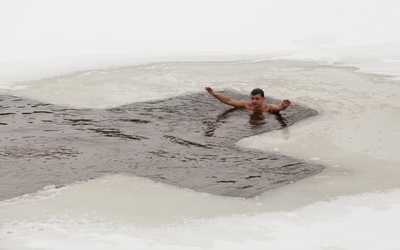Polar Dares: Would You Go for a Swim in Winter?
Every year, my Dad does the Boxing Day Swim. As the name suggests, my Dad will – of his own free will – go to the beach the day after Christmas and swim in the ice-cold sea. Is there a problem with his mental wellbeing? Probably – but not according to wellness expert Greg Brian. The co-owner of BlogMutt and winner of the first annual Yahoo! Content Spotlight Award notes, ‘Those people jumping into frigid water with barely any clothing on aren’t really crazy at all. In fact, you probably know someone (within a sixth degree of separation) who does this ritualistic procedure once a week in winter or on New Year’s Day here in the United States.’ So why are people going for a December dip?
Swimming in ice cold water is a major trend in the US, with quite a few people in various states around the country belonging to an organisation called the Polar Bear Club. In this club, ice swimming is an annual tradition, but aside from this confusing fact another remains; most of the members in the Polar Bear Club are located in New York. This may be partly due to the fact that the lakes and rivers in New York have a more balanced temperature that’s better-suited for this type of swimming – and the Polar Bear Club members have to sign waivers that the organisation isn’t responsible if someone gets hypothermia or worse after being in the water. With this in mind, then, why on earth would you bother?
Brain notes, ‘You can officially mark down this outlandish procedure as a form of preventative medicine — at least according to those who adhere to the original principles behind the Polar Bear Club. The founder of the organisation was also a true-blue New Yorker by the name of Bernarr MacFadden who may be one of the most legendary originators of alternative health who’s been utterly forgotten from even the alternative health world of today. When he founded the PBC in 1903…he also touted the then-unheard-of procedure of swimming in lakes and rivers during the height of winter to help boost the immune system, supposedly help virility and used generally as a natural cure for depression.’
Rightfully, people were sceptical at first but, as Brian explains, ‘MacFadden managed to draw people in who (for generations now) have proof of not getting any colds, flu or any other illness during the year after taking a dip in frigid water on New Year’s Day. People with circulation problems say it helps them feel better—as well as alleviating the effects of arthritis. But MacFadden pointed out already back in the early 20th century that you have to swim in cold water several times a week to get the greatest benefits. With that, he single-handedly blew away the notion that you can catch cold or get pneumonia by swimming in cold water several times a week (while being careful on how long you’re in the water to avoid hypothermia).’
Obviously, this is contingent on what shape your health is in before you take the plunge. Brian says, ‘MacFadden wisely painted an accurate portrait (and still relevant today) of what preventative methods are rather than promoting the typical process you’d see in that era of quick-fix quackery…otherwise known as a panacea in a bottle.’ Brian adds, ‘Even though many who participate may say they do it just for the thrill as well as for charity, any of the few I’ve ever known who’ve done winter swimming says that it did help boost their immune system and prevented them from even having to get a flu shot let alone getting the flu.’ I guess it’s not time to put your swimming costume away just yet!

Comments are closed.